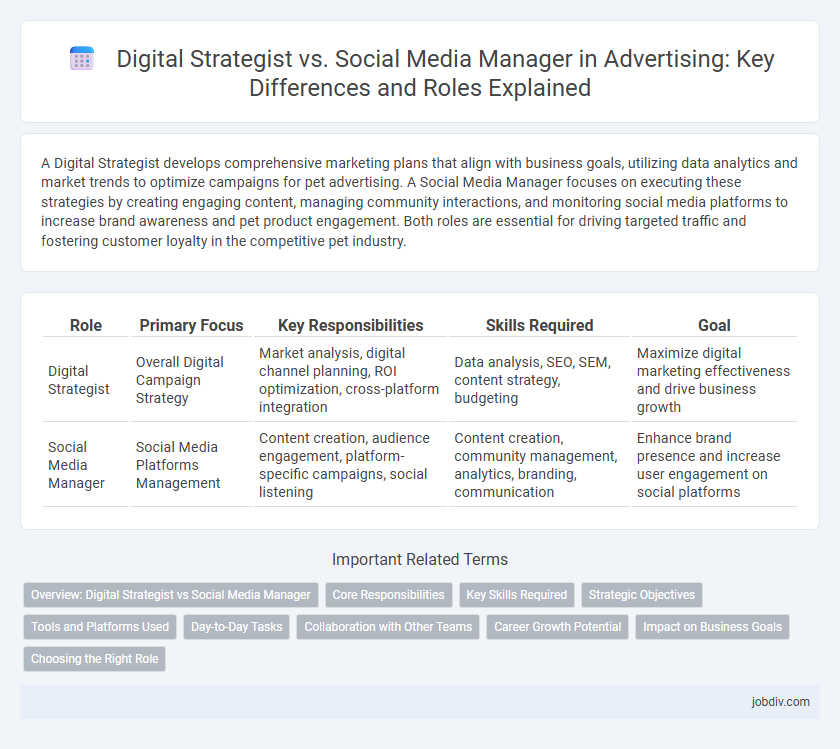A Digital Strategist develops comprehensive marketing plans that align with business goals, utilizing data analytics and market trends to optimize campaigns for pet advertising. A Social Media Manager focuses on executing these strategies by creating engaging content, managing community interactions, and monitoring social media platforms to increase brand awareness and pet product engagement. Both roles are essential for driving targeted traffic and fostering customer loyalty in the competitive pet industry.
Table of Comparison
| Role | Primary Focus | Key Responsibilities | Skills Required | Goal |
|---|---|---|---|---|
| Digital Strategist | Overall Digital Campaign Strategy | Market analysis, digital channel planning, ROI optimization, cross-platform integration | Data analysis, SEO, SEM, content strategy, budgeting | Maximize digital marketing effectiveness and drive business growth |
| Social Media Manager | Social Media Platforms Management | Content creation, audience engagement, platform-specific campaigns, social listening | Content creation, community management, analytics, branding, communication | Enhance brand presence and increase user engagement on social platforms |
Overview: Digital Strategist vs Social Media Manager
A Digital Strategist develops comprehensive online marketing plans integrating SEO, content marketing, and paid advertising to drive business growth. In contrast, a Social Media Manager specifically focuses on creating, curating, and managing content across social platforms to enhance brand engagement and community building. Both roles require analytics and audience insights but differ in scope, with the strategist overseeing broader digital ecosystems and the manager executing platform-specific campaigns.
Core Responsibilities
Digital Strategists develop comprehensive online marketing plans by analyzing market trends, target audiences, and campaign performance data to optimize brand visibility and conversion rates. Social Media Managers execute content creation, community engagement, and platform-specific tactics to maintain brand presence and foster customer relationships on channels like Facebook, Instagram, and LinkedIn. Both roles require strong analytical skills, but Digital Strategists focus on overarching campaign strategy while Social Media Managers manage day-to-day social interactions and content scheduling.
Key Skills Required
A Digital Strategist requires expertise in data analytics, SEO, and cross-channel campaign planning to drive measurable business growth. Social Media Managers excel in content creation, community engagement, and platform-specific algorithm understanding to boost brand presence. Both roles demand strong communication skills, but the strategist emphasizes market research while the manager focuses on real-time audience interaction.
Strategic Objectives
A Digital Strategist focuses on overarching digital marketing goals, aligning campaigns with brand growth, customer acquisition, and market expansion by analyzing data and emerging trends. A Social Media Manager executes platform-specific content strategies, engagement, and community building to enhance brand visibility and foster customer relationships through targeted interactions. Both roles collaborate to ensure cohesive messaging and measurable impact across digital channels, driving strategic objectives effectively.
Tools and Platforms Used
Digital Strategists primarily utilize analytics platforms like Google Analytics and SEMrush to optimize multi-channel campaigns, alongside tools such as HubSpot for inbound marketing and Salesforce for CRM integration. Social Media Managers focus on content scheduling and engagement platforms like Hootsuite, Buffer, and Sprout Social, combined with native tools such as Facebook Business Suite and Twitter Analytics for real-time audience interaction. Both roles leverage collaboration tools like Slack and Trello, but their toolsets are tailored respectively to strategic planning versus daily social media execution.
Day-to-Day Tasks
A Digital Strategist analyzes market trends, creates comprehensive online campaigns, and measures ROI to optimize brand visibility across multiple digital channels. A Social Media Manager focuses on curating content, engaging with audiences, and managing daily interactions on platforms like Facebook, Instagram, and Twitter. Both roles require analytics skills, but the strategist plans high-level goals while the manager executes community engagement and content delivery.
Collaboration with Other Teams
A Digital Strategist collaborates closely with marketing, analytics, and creative teams to develop integrated campaigns that align with overall business goals. Social Media Managers work hand-in-hand with content creators, community managers, and customer service teams to execute platform-specific tactics and engage target audiences effectively. Together, their synergy ensures cohesive messaging and maximized campaign performance across multiple digital channels.
Career Growth Potential
Digital Strategists typically have broader career growth potential due to their focus on comprehensive marketing plans, data analysis, and cross-channel campaign optimization, which opens opportunities in senior marketing roles such as Chief Marketing Officer (CMO) or Marketing Director. Social Media Managers specialize in managing brand presence and engagement on social platforms, offering career advancement into roles like Social Media Director or Content Marketing Manager. The demand for Digital Strategists continues to rise as businesses prioritize integrated digital strategies, while Social Media Managers benefit from increasing investment in social engagement and community-building initiatives.
Impact on Business Goals
A Digital Strategist drives business goals by creating comprehensive, data-driven campaigns that align with overall marketing objectives, optimizing ROI across multiple digital channels. A Social Media Manager directly influences brand engagement and customer loyalty by managing platform-specific content and community interactions, which boosts conversion rates and customer retention. Both roles are crucial, but the Digital Strategist impacts broader business outcomes through strategic planning, while the Social Media Manager delivers tactical execution that enhances brand presence and sales performance.
Choosing the Right Role
A Digital Strategist focuses on developing comprehensive online marketing plans by analyzing data, identifying target audiences, and aligning digital channels with business goals. A Social Media Manager specializes in creating, curating, and managing content across social platforms to engage followers and build brand presence. Choosing the right role depends on whether the priority is strategic planning and analytics or hands-on social media content management and community interaction.
Digital Strategist vs Social Media Manager Infographic

 jobdiv.com
jobdiv.com